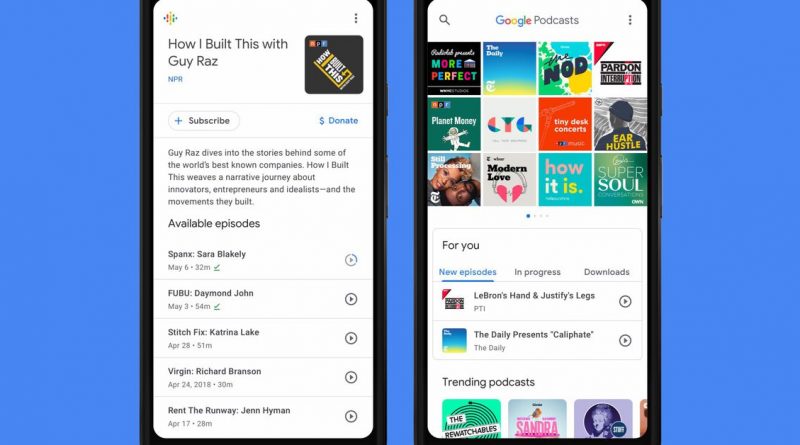Google Podcasts is gone — and YouTube Music can’t replace it
Google Podcasts is dead. It has been dying for months, since Google announced last fall that it was killing its dedicated podcast app in order to focus all its podcasting efforts on YouTube Music. This is a bad idea and a big downgrade, and I’d be more mad if only I were more surprised.
The Podcasts app is just the latest product to go through a process I’ve come to call The Google Cycle. It always goes the same way: the company launches a new service with grandiose language about how this fits its mission of organizing and making accessible the world’s information, quickly updates it with a couple of neat features, immediately seems to forget it exists, eventually launches a competitor out of some other part of the company, obviously begins to deprecate it and shift focus to the new competitor, and then, years later, finally shuts it down for real. The Google Graveyard is full of apps like Reader, Duo, Inbox, Allo, Wallet, and countless others that have been through The Google Cycle, and it feels just as bad every time.
Google says it’s simply responding to the market and that YouTube is a much more popular place for people to find podcasts than Google Podcasts. There is certainly evidence to support that: in its shutdown notice in September, Google cited a statistic from Edison Research that said about 23 percent of podcast listeners in the US say YouTube is their primary podcast platform, compared to 4 percent for Google Podcasts.
What’s most frustrating in this case, though, is that Google had an opportunity to do something genuinely great in podcasts. Podcast discovery is a problem, and so is finding information buried inside hours of audio. What Google should have done was find ways to actually connect its services. When you discover a podcast you love in YouTube Shorts, it should have offered you a one-tap way to subscribe to that podcast in Google Podcasts. It should have made transcripts searchable in Google so you can find the moments and insights you’re looking for right in the audio.
Google had an opportunity to do something genuinely great in podcasts
Google could have owned that whole experience, helping turn a bunch of casual scrollers into listening obsessives — and maybe figured out how to monetize it for everyone. But that would involve the kind of cross-platform, coordinated work that you can’t really expect from the company behind Google’s Many Competing Messaging Apps and Convoluted Reminders Systems. Google has been working on podcasts in various shapes and forms since 2016 and has never even come close to putting all the pieces together.
There’s a very simple, short-sighted logic at work in the move to YouTube Music. YouTube is a video platform; video ads make YouTube lots of money; Google Podcasts doesn’t have video ads. So you can imagine the meeting where someone’s like if we can get everyone to watch podcasts on YouTube, they’ll watch more videos, and we can show more ads! Plus, YouTube Music is a subscription app, and nobody’s going to pay $10 a month for a podcast app. There’s a much straighter line from podcasts to money on YouTube than there is on YouTube Podcasts.
To Google, I say: that’s your fault, and also I don’t care. There are plenty of creators out there who would happily work in a YouTube-like advertising revenue system for audio, but Google never bothered to build one. Podcast apps are also not that expensive to maintain; some of the best ones are run by a single person. It’s one thing to sunset a bad or unpopular app, but Google is killing a good and well-liked one because it’s easier to show you its existing ad inventory somewhere else.
Even allowing for all the moneygrubbing, the main problem is that Google Podcasts is a drastically better podcast app than anything coming out of YouTube. The main YouTube app, forget it; you can’t play things in the background unless you have Premium, which immediately makes it useless for podcasts, so I don’t even have to complain about the confusing intermingling of audio podcasts, video podcasts, non-podcast videos, and everything else.
Within YouTube Music, podcast support has improved over the last six months or so, but the app still massively favors music. The app itself tells you everything you need to know: “Podcasts” is just a filter at the top, next to “Energize” and “Commute.” My podcast queue is currently the 15th row of the homescreen on my app, right below “Trending community playlists” and “Forgotten favorites.” That’s all fine! It’s called YouTube Music! It’s a good music app, and that’s enough. Music deserves its own real estate in the audio / video universe, and so do podcasts.
Music deserves its own real estate in the audio / video universe, and so do podcasts
One way to look at the Google Graveyard is as a bunch of products Google launched that didn’t succeed and thus died. Another way to look at it is as a long history of Google’s inability to make its products make sense. Google has muddled its way through a dozen messaging apps; built several competing VR and AR platforms; killed a bunch of well-liked brands trying to make the smart home happen; and so many more. In every case, there’s a compelling reason for Google to get involved, to try and organize and make accessible some new corner of our technological lives. And over and over, Google has shown it just can’t finish the job.
YouTube Music is the shiny new thing right now, but I wouldn’t bet a dime that the app will even be around in five years. History says it won’t. Luckily, there are plenty of good podcast apps out there, like Pocket Casts, Overcast, Antennapod, and even Apple Podcasts. I’d even half-heartedly recommend Spotify or Pandora, which at least aren’t going away anytime soon. But if you’re a Google Podcasts user, should you use YouTube Music for podcasts? No, you shouldn’t. Because Google has made it clear over and over and over again that it can and will be distracted by shiny new things. The stuff you love will get worse, and it’ll die. Get out of the Google Cycle wherever you can.



